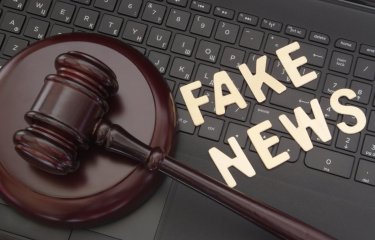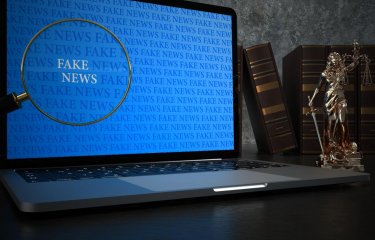How do the epidemiological and media dimensions of a health crisis fit together? How is the spread of a virus linked to the spread of information about it? Several scientists, communication experts and ethics specialists came together to explore these questions at a conference held at the Institut Pasteur in December.
The neologism "infodemic," which refers to the rapid circulation of a large volume of both true and false information, gained in popularity during the COVID-19 pandemic. The conference "Epidemic, pandemic… Infodemic: the other health emergency", organized with Université Paris Cité, was held at the Institut Pasteur on December 2, 2022. We look back at this fascinating forum for discussion by considering some of the main avenues for reflection and key questions addressed during the day.
A conference attended by experts from a wide range of backgrounds
Why organize a conference on the infodemic for experts in both biology and humanities and social sciences? The idea for the conference emerged during regular discussions held between the Department of Global Health at the Institut Pasteur and the Virchow-Villermé Center at Université Paris Cité. The notions of infodemic and infodemiology, historically used by experts in information and communication sciences, have recently been adopted by the World Health Organization. This analogy between a viral epidemic and an information epidemic, an interesting concept from an epistemological and public health viewpoint, gradually gave rise to the idea of holding a multidisciplinary conference combining different fields of expertise and involving the Institut Pasteur and the Virchow-Villermé Center at Université Paris Cité.
Questioning the term "infodemic"
What critical perspective should we adopt when it comes to the term "infodemic"? Is it really relevant? The conference demonstrated that the way in which information about public health circulates and is received by the public has changed dramatically. Nowadays, vast quantities of information are disseminated, mainly over a very short time frame and especially via social media; the type of content varies, there are no filters or hierarchies, and there is a resulting physical and mental impact on society. This new information ecosystem that has developed alongside Web 2.0 has proven to be a game changer, with a negative impact on public discourse. Scientific, medical and public health messages are now compromised, swamped by a mass of information from all directions. Although much of the information passed on is true or harmless, some is fake, misleading or sometimes even deliberately incorrect. Depending on the specific case, this "pathology of information" may refer to concepts such as misinformation, disinformation, information mess, fake news, rumor, defamation, propaganda and conspiracy theories. The term "infodemic" encompasses all these notions. But its impact must be seen in perspective: the information circulated does not always meet with approval and is sometimes even openly derided. Audiences have become more cautious, and the influence of the infodemic can sometimes appear more marginal.
Qualifying the role of social media
Although the role of social media is often held up in discussions about widespread disinformation, do we not tend to minimize the importance of traditional media and private discussions? In seeking to understand the ways in which information can be distorted, we must not focus our attention exclusively on social media. Firstly, the correlation between the spread of fake news on social media and the growing distrust of health authorities, reflected for example in vaccine hesitancy, cannot always be proven. And secondly, there are also other factors involved. Family members, healthcare providers, social, cultural and professional environments and political messaging all play a decisive role in the circulation of information and the adoption of certain behavior. Traditional media – television, radio and the press – are also crucial in the spread of information, and they can have just as big an impact in the emergence of fake news. In conclusion, social media alone are not responsible for disinformation; other spheres of influence also affect individual choices in the area of health.
Reconfiguring the dialog between science and society
Surely the pandemic and the relative lack of trust in institutions must force scientists to create new spaces for dialog and discussion with society? Scientists and healthcare workers all have their part to play in preventing the negative impacts of the infodemic.It is crucial to train professionals in these issues and to raise awareness and understanding among the public. Maintaining good relations with the public, nurturing public trust and fostering a critical mindset, in a climate of openness and dialog, are vital. More specifically, scientists need to step up to the task of making knowledge accessible and creating spaces for sharing with society. Multiple initiatives to this end have been developed by laboratories, museums, universities, public and cultural venues and schools. Scientists must keep listening to society, seeking to understand the needs and expectations of the population and responding with their expertise, while not shying away from points of contention and clearly expressing the limits of their knowledge.
From COVID to the climate crisis
What lessons in communication from the COVID pandemic could give us a better grasp of other ongoing crises, for example the climate crisis? For a large part of the Western population, despite the wealth of scientific information, climate change remains a complex, abstract topic that is yet to have an impact on their daily lives. The threat is also viewed differently: while many people were afraid of being infected by the virus, climate change is not seen as contagious. But research shows that public health is one of the arguments that resonates most strongly with people and is most likely to lead to changes in behavior. The way in which we address these issues strongly influences perceptions of urgency and willingness to react. Providing new narratives about climate change that refer to the environmental emergency as a health emergency may therefore help break down psychological barriers. This could be a way of positively harnessing public attention by emphasizing the direct co-benefits of climate action for health.
(NB: Olivier Aïm, lecturer in Information and Communication Science at CELSA; Hervé Bourhy, Director of the Department of Global Health at the Institut Pasteur; Anneliese Depoux, Director of the Virchow-Villermé Center for Public Health Paris-Berlin at Université Paris Cité; and Bérangère Virlon-Chadeau, Manager of the Department of Global Health at the Institut Pasteur, all contributed to the drafting of this text)





